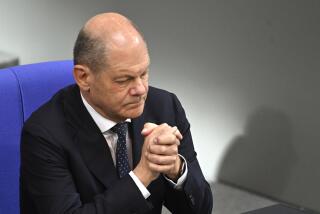GERMANY IN TRANSITION : To Some New Emigres, Home Is Looking Better : East Germans: An unknown number of refugees have changed their minds now that reforms are under way.
- Share via
WEST BERLIN — Many East Germans who have fled recently to West Germany have changed their minds and want to return home, officials said Friday.
But, “many who wish to go home first want to find out what kind of welcome will await them,” a Red Cross official cautioned. “They also want to find out what happened to their jobs and apartments.”
The West German Red Cross is in contact with its East German counterpart to discuss ways to help those refugees who want to go home, another Red Cross official said. The West German Red Cross also has made available counselors in four of the West German relocation centers.
Hard figures on those now seeking to return are not available because many are reluctant to spell out their desire to West German refugee officials. But Werner Stoecke, East Germany’s Red Cross vice president, estimated returning emigrants at about 200 a day.
Other East German officials predict that the number will rise as Christmas approaches and emigrants become homesick.
Of the departing East Germans, Patricia Chop, assistant director of the Marienfelde relocation camp here, declared: “They don’t tell us officially that they want to leave. They just leave.”
Marienfelde itself can accommodate 900 refugees--but the headquarters spreads the overflow to 58 community centers and sports halls around West Berlin to house a total of 24,000 refugees.
“It is difficult to assess the number of those who are going back or who want to go back,” Chop said. “They leave suddenly, in twos, threes and fives.”
Now that the border is open, some simply pass through it along with the estimated 3 million East Germans who visited West Berlin and West Germany last weekend. Many have collected their 250 marks (about $140) in refugee money and are therefore embarrassed about formally declaring they are no longer emigrants and having to give back the funds, sources say.
Then, too, some have collected the 100 marks in “welcome money” that all East Germans arriving in West Germany are entitled to once a year.
At the Red Cross headquarters in West Berlin, a senior official, Karl Hoffmann, said complicated negotiations are under way with the East German government to determine what sort of reception those East Germans who have changed their minds about emigrating will receive.
Several days ago, the East German government indicated that it might extend an amnesty to those emigrants who have changed their minds about settling in West Germany. However, it made no mention of those who fled the country illegally through Hungary, Czechoslovakia and Poland.
“There are many refugees who would like to go back, but they aren’t sure what the situation will be--and they don’t trust the government,” Hoffmann said. “We are trying to set up facilities for those who wish to return, but the procedures will take another week or more to work out.”
In Marienfelde, Margite Hartmann said she had fled from Karl-Marx-Stadt through Prague and has no intention of going back. She, her husband, Hans-Juergen, a carpenter, and their 8-year-old-daughter, Nicole, are planning to stay in West Berlin, where they have friends.
“Many people say they want to go back,” she acknowledged. “For those who left East Germany because they couldn’t travel, the opening of the Berlin Wall makes a lot of difference.”
But, she added, “Our own city was in terrible shape. We couldn’t find a pediatrician, and there was no fresh food in the stores. So we have no regrets. But probably many East Berliners feel differently. They seem to be changing their minds.
“But you never know. Sometimes a family just disappears overnight, and we presume they have gone back across the wall.
“Most of us who left were hoping for change--and some of them may now think that the time for change has come.”
More to Read
Sign up for Essential California
The most important California stories and recommendations in your inbox every morning.
You may occasionally receive promotional content from the Los Angeles Times.













